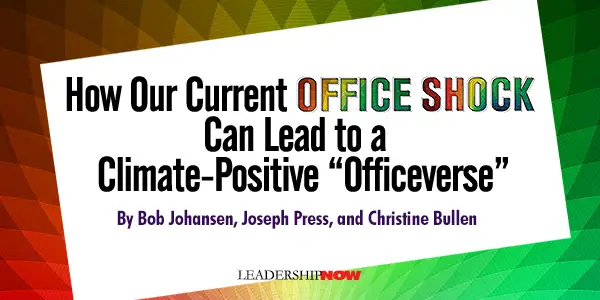 |
 |
02.13.23

How Our Current Office Shock Can Lead to a Climate-Positive “Officeverse”
MANY OFFICES that were shuttered during the COVID-19 pandemic had inherent problems even before the crisis. Traditional offices were often unfair, uncomfortable, uncreative, and unproductive. COVID-19 forced millions of people to work and live in ways they’d never attempted before, leading to a state of “office shock.” Fixed became fluid. Unexamined assumptions about offices and office work opened into probing questions that demanded careful thought. It took a global pandemic to shake open executive minds to the possibility of better ways of doing office work. Further, many traditional offices were climate-negative, while some were climate hostile. But overall, climate impacts improved during the shake-up with the promise of much more to come. Offices and officing could be an important catalyst for positive climate choices. Buildings and their construction are among the largest contributors to global resource use. In considering the opportunity offices can play in changing the narrative for a better future, legendary architect Frank Duffy offered a stark indictment of traditional offices: The Taylorist office building has been a perfect machine for delivering environmental degradation because it’s so completely the product of supply-side thinking, which overrides user interests, ignores the public good and takes no account of collateral damage. Why do we work in offices at all? During COVID-19 shutdowns a lot of productive office work got done without offices. Hybrid work and flexibility are now normalized, but the future of work is up for grabs. Office shock will continue for many years to come. And that can be an opportunity for climate-positive officing. COVID-19, along with the internet, were catalysts for office shock, which has revealed impossible futures for offices and officing that are now possible. An emerging “officeverse” is shaping new models in an ever-changing mix of work, place, and time options for living and working. Climate-Positive Offices In the corporate real estate industry, Duffy argued that the root cause of climate abuse by offices is the office supply chain and its incentives. Facility managers should be rewarded for maintaining highly sustainable environments, not merely reducing costs. Design and construction professionals should be rewarded for making the most imaginative and efficient use of existing spaces, rather than for new building. Finance and development providers should be rewarded for sustainably managing what exists already, rather than pursuing new ventures. We can all do much to improve the regenerative capabilities of offices. Critical choices must be made to change consumption, produce with circularity, and regenerate the planet. Our current state of office shock could be a much-needed spark for the choices about our future that could rein in impending disasters. Office shock provides an opportunity to reverse the many unsuccessful attempts at doing the right thing. At the same time, the window of opportunity is closing quickly. The UN Secretary-General, António Guterres, reacted to the Intergovernmental Panel on Climate Change (IPCC) Sixth Assessment Report published on April 4, 2022, saying the report reveals “a litany of broken climate promises” by governments and businesses. He even accused many of lying when claiming to be on track to limiting future heating to 1.5°C above pre-industrial levels. In a strongly worded rebuke, Guterres said: “It is a file of shame, cataloguing the empty pledges that put us firmly on track towards an unlivable world.” While technical solutions are necessary, they are insufficient to bring about a change in behavior. To have an effect, we will need to change minds and systems. A climate-positive future will need to incorporate social, economic, political, and cultural changes to address this urgent need and provide a way to examine the span of choices from net-zero, where people and offices don’t contribute to the emission of greenhouse gases, to Regenerative, where active steps can be taken to cultivate and renew the resources of our planet. Finding the harmony of choices that will enable us to fight in this battle for survival is critical to a better future. A sustainable future requires making choices today to make a climate-positive impact. The office can be the place where organizations converge on a shared purpose of sustainability. Here are some ideas to adopt for a climate-positive officeverse:
 
Posted by Michael McKinney at 08:22 AM
|
BUILD YOUR KNOWLEDGE
 

How to Do Your Start-Up Right STRAIGHT TALK FOR START-UPS 
Grow Your Leadership Skills NEW AND UPCOMING LEADERSHIP BOOKS 
Leadership Minute BITE-SIZE CONCEPTS YOU CAN CHEW ON 
Classic Leadership Books BOOKS TO READ BEFORE YOU LEAD |